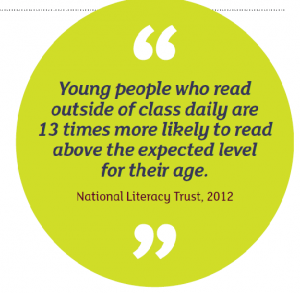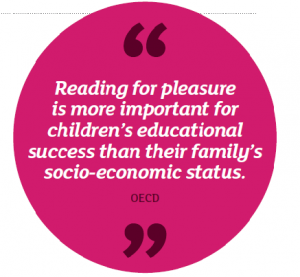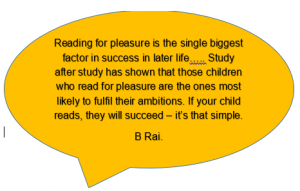Reading
In the Foundation stage the teacher introduces concepts of print and teaches synthetic phonic skills using the RWI scheme within ability groups on a daily basis.
They take home letter sounds to learn on a weekly basis. Children take non text books home to share with their parents. When the teacher feels the child is ready, he/she begins to take a differentiated printed text book home. Children read individually to an adult on at least a weekly basis (more for children who are reading at a level below age expected level). Group reading also takes place once a week. In Key Stage 1 this practice is continued. In addition to focusing on decoding, there is an emphasis on checking that the children understand what is read, their views on the story and linking this to other experiences.
In Key Stage 2, the progress made in Key Stage 1 is built upon. The focus is on developing higher order reading skills such as inference and deduction, skimming and scanning including the ability to read and compare texts critically. Where necessary, specific phonic support is used to develop children’s reading skills through the use of interventions. Children continue to participate in guided reading sessions regularly.
Across phases topics are delivered through the vehicle of a class text. This text is chosen to challenge the children’s understanding and concepts in order to provide them with rich experiences beyond their reading abilities.
As well as the above, all children are provided with the opportunity to borrow one book each week from the library. Children are encouraged to choose books, which they are interested in and this helps to promote reading for pleasure. The library is also used for story time sessions. Children from upper key stage 2 are chosen to be Junior Librarians, these ambassadors run the library on a daily basis.
Across the school an ethos for reading for pleasure has been introduced to promote a love of reading in children. Some activities include: whole school reading days, reading journals, reviews of poems and books by children and whole class texts that are used as a stimulus for their learning. In each year group children have access to read high quality books that will broaden their vocabulary and deepen their experience of texts.
At Wibsey Primary School we strongly believe that reading is a key skill which forms the foundation of life-long learning. Successful reading is underpinned by an emphasis on phonics in the early teaching of reading.
With this strong foundation, we believe that extensive reading, access to a wide range of high quality texts and daily reading for pleasure plays a significant part in our children’s educational achievement. Research shows that children who choose to read for pleasure are actively improving their life chances.
We aim for our children to read fluently and for understanding so that they can become independent learners now, and in future years. Through reading widely, our children will acquire a wider vocabulary, allowing them to communicate in writing or through discussion with confidence. Most importantly, reading for pleasure will develop our children’s understanding of the world they live in, and empathy for its different cultures and people.



At Wibsey Primary School, we celebrate children’s achievements in reading at school, as well as the positive attitudes modelled by children in their reading endeavours at home. All children are expected to read daily at home, and respond to texts in a variety of ways, through tasks set in the Reading Journals. Children who show that they have completed their Reading Journal tasks at home with determination and enthusiasm, are rewarded with a half-termly afternoon tea, which is hosted by Mrs Yates, where one child per class is selected to attend. The group enjoys an hour talking about the books they have read and their enjoyment of these, as well as eating cake!
